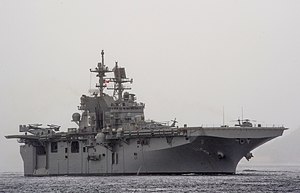USS Bougainville (LHA-8)
 Sister ship USS America
| |
| History | |
|---|---|
| Name | Bougainville |
| Namesake | Bougainville Campaign[1] |
| Awarded | 30 June 2016[2] |
| Builder | Huntington Ingalls Industries[2][3] |
| Status | On order |
| General characteristics | |
| Class and type | Template:Sclass- |
| Displacement | 44,971 long tons (45,693 t) |
| Length | 844 ft (257 m) |
| Beam | 106 ft (32 m) |
| Draft | 26 ft (7.9 m) (7.9 meters) |
| Propulsion | Two marine gas turbines, two shafts, 70,000 bhp (52,000 kW), two 5,000 horsepower (3,700 kW)* auxiliary propulsion motors. |
| Speed | over 22 knots (41 km/h; 25 mph) |
| Boats & landing craft carried | |
| Complement |
|
| Sensors and processing systems | |
| Electronic warfare & decoys |
|
| Armament |
|
| Aircraft carried | |
USS Bougainville (LHA-8) is a planned Template:Sclass- to be built for the United States Navy. It will be the second Navy ship to be named Bougainville.[6][1] Bougainville will be built by Huntington Ingalls Industries at its shipyard in Pascagoula, Mississippi[3] and is expected to deliver in 2024.[1]
Design
The design of Bougainville is based on USS Makin Island, itself an improved version of the Template:Sclass-. While Makin Island had a well deck, the earlier two Flight 0 America-class ships USS America and USS Tripoli were designed and built without a well deck to make space for aircraft and aviation fuel.[7] Bougainville will be the first Flight 1 America-class ship,[1] and as such will include a well deck.[2] The design of the Flight 1 America-class ships, including that of the Bougainville, adopts a compromise, incorporating a slightly smaller aircraft hangar as well as smaller medical and other spaces to fit a small well deck for surface connector operations.[2][8] The island structure will also be modified to free up more room on the flight deck to accommodate maintenance of V-22s, compensating for some of the lost aircraft hangar space.[8]
Bougainville will be the first in her class built with a redesigned and stronger main deck; the earlier America-class vessels America and Tripoli each required retrofitting in order to handle the strain of daily Marine F-35B Lightning II STOVL operations.[9] In addition, Bougainville will incorporate the Enterprise Air Surveillance Radar (EASR) volume air search radar in lieu of the AN/SPS-48G air search radar in America and Tripoli.[4] The Template:Sclass-s starting with John F. Kennedy and the planned LX(R) will also have this radar.[10]
References
- ^ a b c d Eckstein, Megan (9 November 2016). "Mabus Names LHA-8 After Bougainville Island Campaign in World War II". USNI News. U.S. Naval Institute. Retrieved 9 November 2016.
- ^ a b c d Eckstein, Megan (30 June 2016). "Ingalls Wins LHA-8 Contract, NASSCO To Build 6 Fleet Oilers". USNI News. U.S. Naval Institute. Retrieved 25 July 2016.
- ^ a b LaGrone, Sam (22 August 2016). "Raytheon Awarded $92M Navy Contract for Future Carrier, Big Deck AESA Radars". USNI News. U.S. Naval Institute. Retrieved 9 November 2016.
- ^ http://www.dote.osd.mil/pub/reports/FY2008/pdf/navy/2008lha6.pdf
- ^ "SECNAV names next Amphibious Assault Destroyer" (Press release). U.S. Department of Defense. 9 November 2016. Retrieved 9 November 2016.
- ^ GAO-09-326SP 'Defense Acquisitions: Assessments of Selected Weapon Programs', U.S. Government Accountability Office, 30 March 2009
- ^ a b Freedberg, Sydney J. Jr. (3 October 2012). "Navy's Newest, LHA-6, A Dead End For Amphibious Ships?". Retrieved 9 November 2016.
- ^ LaGrone, Sam (22 March 2016). "USS America Back to Sea After Completing 10-Months of Deck Strengthening for F-35s". USNI News. U.S. Naval Institute. Retrieved 25 July 2016.
- ^ "Navy C4ISR and Unmanned Systems". Sea Power 2016 Almanac. Navy League of the U.S. January 2016. p. 91.
External links
